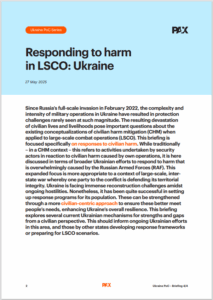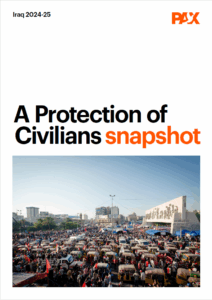After Hawija: The way forward for the Dutch Ministry of Defense
For the past months, a consortium of civil society organizations, including PAX, have engaged with the Dutch Ministry of Defence (MoD) on its policies and practices regarding possible civilian harm -both directly and indirectly - as a result of Dutch military operations, presence, or activities. Nearing the end of this so-called 'Roadmap Process', the MoD is expected to provide recommendations to the Minister of Defense for improvements to Dutch policy on transparency and civilian harm mitigation when engaging in military (article 100) missions.
The need and opportunity for engagement between the MoD and civil society organizations became evident in the aftermath of ‘Hawija’: Through public reporting and parliamentary debates it became evident that the Dutch bombing of an ISIS munitions factory in Hawija, Iraq, in June 2015 - carried out as part of the US-led International Coalition against ISIS - had caused at least 70 civilian deaths. It took over four years before the Dutch Parliament was informed about this large-scale civilian casualty event. In response, Defense Minister Bijleveld in 2019 decided to review the military’s civilian casualty and transparency policies.
On 29 May 2020, Airwars, Amnesty Netherlands, Center for Civilians in Conflict (CIVIC), Open State Foundation, PAX and the Utrecht University Intimacies of Remote Warfare Program - organizations with expertise in transparent reporting, air operations, research on the ground, and civilian harm evaluation and mitigation - proposed a “Roadmap for the Ministry of Defence to review the way in which the Netherlands deals with, reports on, evaluates and accounts for civilian harm as a consequence of Dutch military efforts”. Our objective was to engage with the MoD, as it stood at this critical juncture of policy review, to share our perspective and expertise on how to enhance its transparency and accountability, while also creating conditions for a stronger integration of civilian harm evaluation and mitigation approaches into Dutch military deployments.
We recently concluded four interactive sessions with the MoD; following the final session, MoD staff have committed to using the outcomes of these “Roadmap sessions” to formulate policy recommendations to be presented to the Minister of Defence. These will include measures that can be implemented in the short term, as well as measures that potentially require further consultation with a delegation of consortium members and/or other organizations, leading to a number of expectations regarding policy change, which we hope will be met by the MoD in the coming weeks and months.
Our recommendations center around improving transparency, as well as aiming to improve broader Dutch policy and practice in order to achieve better protection of civilians in future military deployments generally (see the next page for a selection of our recommendations). While our consortium and the MoD may not always have shared the same perspectives when discussing the required policy and practice changes, we welcome the open manner in which the MoD has engaged with us and we stand ready to share our expertise and insights with them again in future engagements.
Recommendations (selection)
- Dutch military and political leadership recognise the imperative of civilian harm mitigation, transparency, and accountability in all aspects of Dutch military efforts including own operations, partnered military operations, and security force assistance.
- Dutch military and political leadership add mitigation and monitoring of civilian harm in the article 100 procedure, as well as including it in their yearly progress reports and the end evaluation report of each mission to Parliament.
- A Protection of Civilians (POC) lens is integrated during all phases of the military cycle (the planning, conduct, monitoring and evaluation of military operations), as a way to minimize civilian harm while improving overall mission effectiveness.
- The MoD prioritizes and resources monitoring of civilian harm in current and future military deployments, including through the creation of a civilian casualty tracking cell (with full-time or dual-hatted staff).
- The MoD develops and disseminates clear policies for civilian harm tracking and response (including amends policies) adapted to partnered operations and coalitions operations.
- The MoD combines open-source information, external sources, and military intelligence with field investigations, where possible, when investigating all claims of civilian harm, and does not limit itself to investigating those cases which draw a large amount of attention from media and other actors.
- The MoD publishes the specific date; near location; munition type used; and nature of target for all Dutch weapon deployments in the anti-ISIS Coalition from 2014 to 2018; and in all future missions.
- The Dutch MoD publishes information on strikes as open data that is technologically, legally, and substantively ready for reuse by monitoring organizations, NGOs, media, and others, to ensure accountability, and encourages other potential coalition members to do the same.
- The MoD publishes regular (monthly) reports on civilian harm allegations from past and current missions; these reports are always shared publicly, unless this jeopardizes national, operational and personnel security concerns. Then they will be shared confidentially with Parliament.
- Civil Society engagement on issues pertaining to civilian harm mitigation, transparency and accountability is institutionalized and resourced, both at the central level and in the area of deployment.
About this news
Date of publication:
Jul 01, 2021
Publisher:
Airwars, Amnesty Netherlands, Center for Civilians in Conflict (CIVIC), Open State Foundation, PAX and the Utrecht University Intimacies of Remote Warfare program (IRW)
Download the full statement
